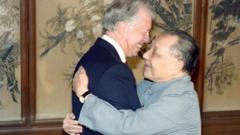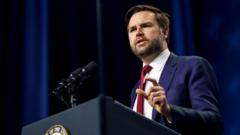Jimmy Carter's decision to establish diplomatic ties with China in 1979 marked a significant turning point in global politics. His personal relationship with Deng Xiaoping and commitment to fostering connections reshaped US-China relations, contributing to China's rise on the world stage while introducing complexities that resonate in contemporary geopolitics.
The Impact of Jimmy Carter's Engagement with China: A Legacy of Diplomacy

The Impact of Jimmy Carter's Engagement with China: A Legacy of Diplomacy
An exploration of how Jimmy Carter's presidency redefined US-China relations, paving the way for China's economic growth and the complexities of modern diplomacy.
On a notable January morning in 1979, US President Jimmy Carter welcomed a pivotal guest to the White House: Deng Xiaoping, the first leader of Communist China to visit the United States. This meeting initiated a groundbreaking diplomatic relationship that significantly shaped global politics, ultimately fostering China's economic rise and setting the stage for future US-China relations characterized by both cooperation and rivalry.
Establishing formal ties with China stands out as one of Carter's remarkable legacies, particularly during a presidency marked by challenges. His birthday coincided with the founding of the People's Republic of China, which he often referred to as a sign of destiny linking him to the nation. Despite the ups and downs of the relationship post-presidency, he is still remembered fondly in China, credited with helping to lift the country out of isolation. Following his passing, Beijing acknowledged him as the “driving force” behind the 1979 agreement and affectionately dubbed him "Meirenzong," or the "benevolent American."
Carter's initial encounters with China date back to 1949 when he served as a US naval officer during China’s civil war. At the time, he was positioned near Deng Xiaoping, who would later become a key figure in shaping China during their eventual meeting decades later as heads of state. While Nixon and Kissinger had already laid the groundwork for preliminary engagement, it was Carter who solidified this relationship, facilitating deeper ties with earnest diplomatic efforts and negotiation.
The historic moment arrived in December 1978, when both nations announced their intent to recognize each other, effective January 1, 1979. The announcement was met with global surprise and marked a significant repudiation of US support for Taiwan, which had been a contentious issue in US-China relations. This shift ushered in the One China policy, which remains a cornerstone of diplomatic relations today even as it raised questions regarding the US's commitment to its allies, particularly Taiwan.
Historians credit Carter's unique rapport with Deng Xiaoping for the success of these diplomatic efforts. Their shared practical approach and mutual respect proved instrumental. As they sealed agreements during Deng's visit to the US, the personal chemistry between them was tangible.
The significance of their joint ventures cannot be understated. Their negotiations not only established a congenial relationship between the two nations but also stimulated China's growth through trade policies leading to increased economic integration. Under Carter, China received "most favored nation" trade status, which doubled trade between the two countries within a year.
Carter's dedication to China didn’t wane after his presidency. The Carter Center facilitated grassroots democracy initiatives in the 1990s and participated in various humanitarian projects, fostering his enduring connection with the Chinese populace. Remarkably, in contrast to many former presidents, he returned multiple times to China, often engaging in volunteer activities, further endearing him to the Chinese people.
Despite his efforts, relations grew strained under subsequent administrations, particularly after Xi Jinping took power. Carter faced an increasingly difficult environment, reflected in the limited attendance at events held in his honor during later visits, which demonstrated the deteriorating rapport between the two nations.
As he aged, Carter expressed concern about the current trajectory of US-China relations, warning of a potential new Cold War. His reflections on the 40th anniversary of the normalization of relations emphasized the ongoing relevance of fostering shared futures.
Ultimately, the legacy of Jimmy Carter's engagement with China remains complex—a blend of significant diplomatic achievements contributing to economic growth, tempered by the realities of an evolving geopolitical landscape. His hopes for a future rooted in joint efforts between the two nations continue to resonate amid contemporary challenges.





















